Paripi Kongming is one of the spring anime series that will be adapted into anime from April 2022. The story follows the famous military strategist Zhuge Liang of the Three Kingdoms period, who is transported to the present day and uses his skills as the strategist for Tsukimi Eiko, who aspires to become a world-class singer-songwriter. There are many famous anecdotes and stories about Zhuge Liang and the Romance of the Three Kingdoms, some of which even appear in the story. In this article, we'll introduce some anecdotes and stories related to Kongming, including those that appear in the story!
First of all, what is Paripi Kongming about? Here's a quick summary!

In 234 AD, Zhuge Liang, the prime minister of Shu, died of illness during the Battle of Wuzhang Plains. On his deathbed, he expressed a desire to be reborn in a peaceful world. He woke up to find himself transported to Shibuya on Halloween in his younger days. He thought this was hell, but he encountered modern music culture and was inspired by the singing of budding singer-songwriter Tsukimi Eiko. Tsukimi Eiko worked at a clubhouse and aspired to become a singer, but she struggled to make a name for herself. By chance, Kongming is taken in by Yingzi, and while he is surprised by modern civilization, he quickly becomes accustomed to the modern world. Kongming becomes her military strategist and devises various strategies to guide Yingzi to become a world-class singer.
Anecdotes from the Romance of the Three Kingdoms, Part 1: The Oath of the Peach Garden
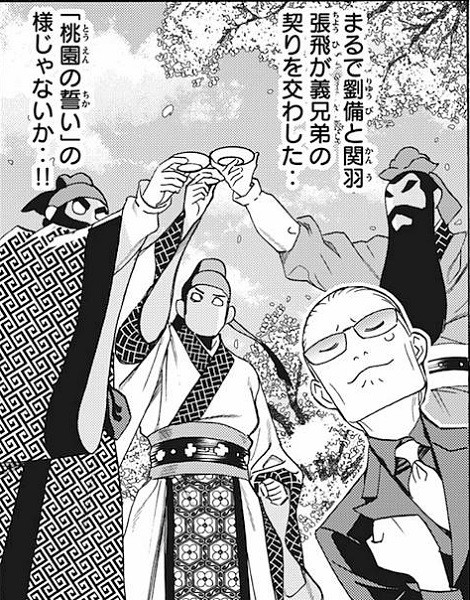
At the end of the Eastern Han Dynasty, the world was in turmoil due to political corruption. Disgruntled peasants rose up in armed uprising, resulting in the Yellow Turban Rebellion. As a young man, Liu Bei Xuande joined the volunteer army and, together with his comrades, suppressed the rebellion. The "Oath of the Peach Garden" describes the event in which the three men, Guan Yu, Zhang Fei, and Liu Bei, gathered at that time and swore to become sworn brothers. However, this is not a historical fact but an adaptation from the fictional novel "Romance of the Three Kingdoms." In "Romance of the Three Kingdoms," Liu Bei plays a major role in the Yellow Turban Rebellion, but his historical background is shrouded in mystery, making it unclear whether he was truly amazing or not.
Anecdotes from the Romance of the Three Kingdoms, Part 2: Weeping and Beheading Ma Su
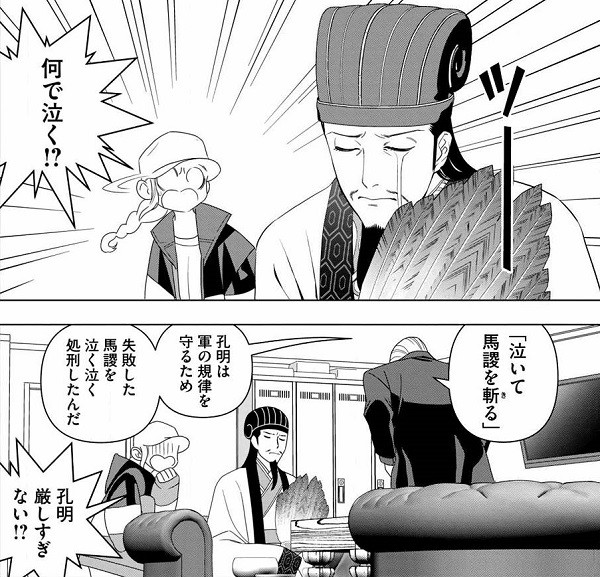
In 228, during the First Northern Expedition, Zhuge Liang entrusted his beloved disciple Ma Su with guarding Jieting. He faced opposition from those around him, but he ignored them and instead of stopping the rebellion, he abandoned his subordinates and fled before the enemy. This forced the Shu army to end the Northern Expedition and retreat. This defeat was a bitter blow to Shu in the future. Ma Su was a promising and beloved disciple whom Zhuge Liang had taken an interest in, but he executed Ma Su while crying in order to maintain military discipline. Hence the phrase "crying and executing Ma Su" is now used to describe imposing harsh punishment on even a family member or close friend in order to maintain discipline.
Stories and Anecdotes from the Romance of the Three Kingdoms, Part 3: Of the 36 Stratagems, Fleeing is Better Than Flying
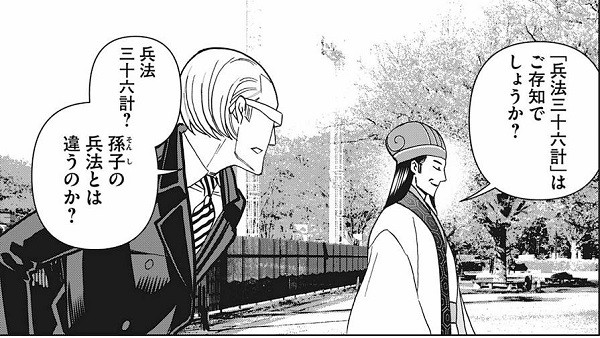
Though not strictly speaking a story from the Romance of the Three Kingdoms, in "Paripi Kongming," Kongming makes full use of his 36 Stratagems. These are tactical strategies described in the "36 Stratagems of War." Written during the Wei, Jin, and Northern and Southern Dynasties periods, this tactical manual includes a section titled "Run for Success." This means fleeing if you can't win and limit your losses. However, today, this phrase is used to mean that if your opponent is too strong and you still can't win, it's better to flee quickly before devising a strategy, or that avoiding unnecessary battles will minimize your losses.
Anecdotes from the Romance of the Three Kingdoms, Part 4: The Dead Kongming Forces the Living Zhongda to Run
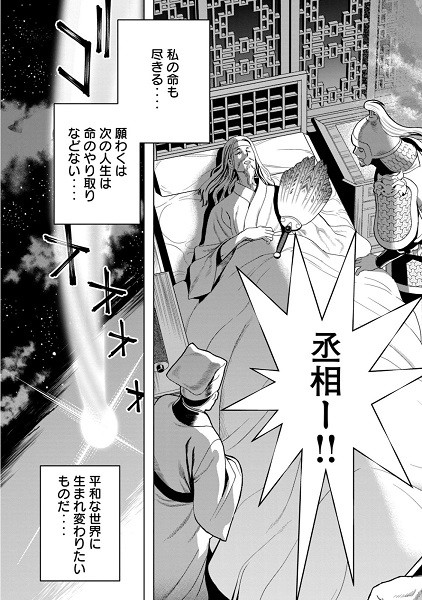
In 234, Zhuge Liang died of illness at the Battle of Wuzhang Plains. His subordinates retreated, and upon seeing this, Sima Yi Zhongda of the Wei army attempted to pursue them. However, when the Shu army showed signs of intending to counterattack, Zhongda became suspicious that Kongming might still be alive, and abandoned his pursuit. This example of the influence of the dead on the living is often referred to as "The Dead Kongming Forces the Living Zhongda to Run."
Anecdotes from the Romance of the Three Kingdoms, Part 5: The Three Visits
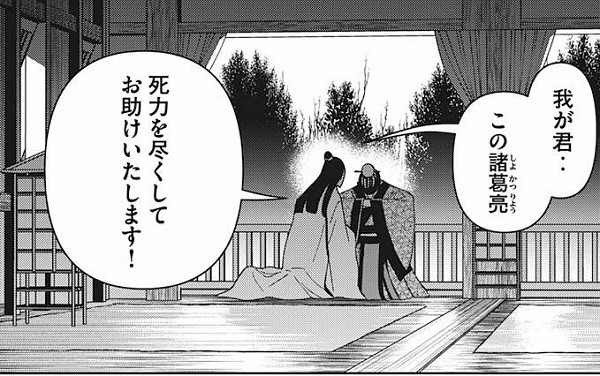
Liu Bei was active during the Yellow Turban Rebellion and traveled from place to place, but not everything went smoothly. He also experienced many failures. Although Liu Bei and his men were a charismatic group, they were nothing more than a group of charming delinquents. Liu Bei needed someone to serve as his strategist. Even after being rejected, Liu Bei visited Zhuge Liang three times, and finally secured his position. This story is used when a superior person shows the utmost courtesy and asks a subordinate for a favor.
Anecdotes from the Romance of the Three Kingdoms, Part 6: The Plan to Borrow Grass Boats
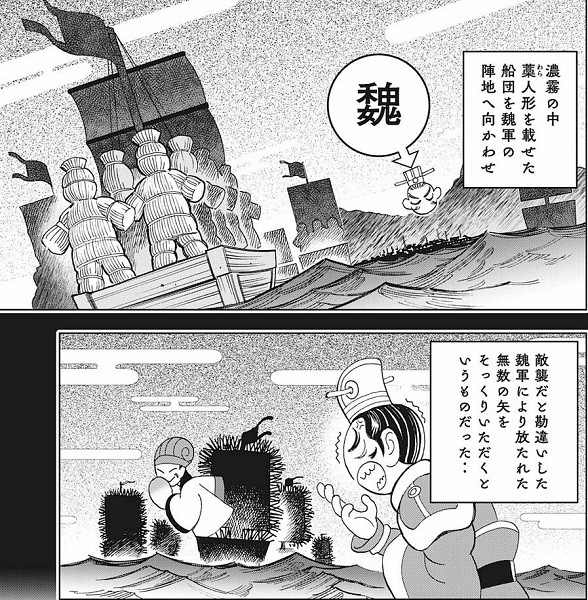
In the Romance of the Three Kingdoms, during the Battle of Red Cliffs, where the armies of Liu Bei and Sun Quan clashed with Cao Cao's army, Zhou Yu of the Wu army gave Kongming an impossible task: procure 100,000 arrows within 10 days or face death. However, Kongming successfully accomplished this challenge. His method: disguise an attack on Cao Cao's army by sending a warship loaded with straw dolls amidst a thick fog. Cao Cao's forces fired arrows in retaliation, but the arrows were impaled on straw dolls and consumed. Due to the thick fog, Cao Cao's forces were unaware of the false attack.
Anecdotes from the Romance of the Three Kingdoms, Part 7: The Interplay of Fish and Water
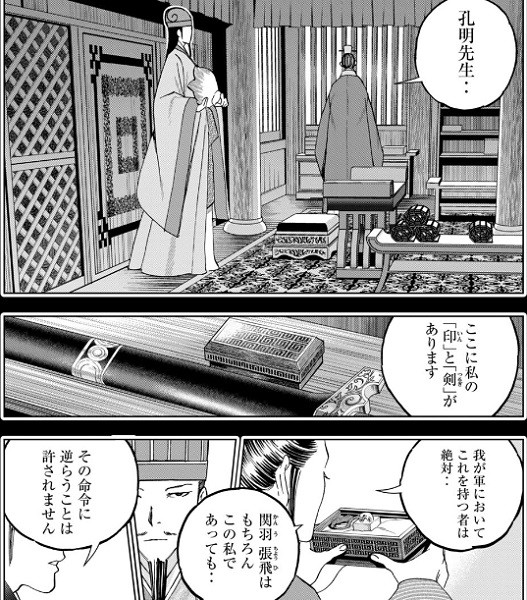
After recruiting Zhuge Liang through the Three Visits, Liu Bei and Zhuge Liang's relationship grew ever closer. However, Liu Bei's position was like that of a gang leader, while Zhuge Liang's was like that of an elite student at a prestigious school. Liu Bei's subordinates, Guan Yu and Zhang Fei, could not help but be pleased to see these two people, who would normally never have crossed paths, growing closer. Liu Bei then told them, "To me, Kongming is like a fish to water." This extremely close relationship is often described as a relationship between fish and water. A similar expression is also used: a relationship between two people who are like a neck to a neck. This expression dates back to the pre-Late Han Dynasty and describes the relationship between Lian Po and Lin Xiangru, characters who also appear in Kingdom.
[Party Kongming] A Compilation of Stories and Anecdotes from the Romance of the Three Kingdoms
This article summarizes stories and anecdotes from the Romance of the Three Kingdoms, particularly those related to the story of Party Kongming. Zhuge Liang (Kongming) is a real historical figure, and knowledge of his history will enhance your enjoyment of the work. It may also be interesting to learn about his exploits in both historical fact and the Romance of the Three Kingdoms.
Party Kongming will be adapted into an anime in 2022. You'll enjoy it more if you're familiar with the Romance of the Three Kingdoms, but it's still an interesting show even if you're not, so be sure to give it a watch!




